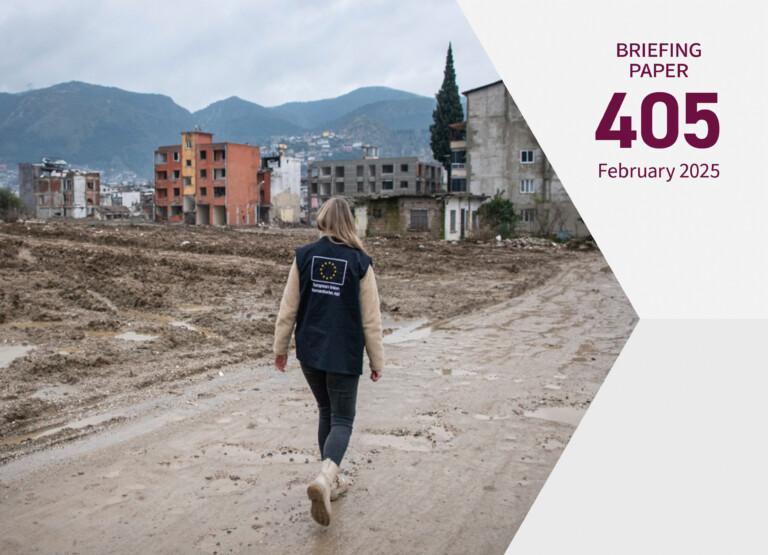The situation on the Korean Peninsula remains highly unpredictable and continues to pose a major threat to regional stability and global security. The North Korean economy is not showing major signs of improvement, and the sustainability of the political system can be questioned.
In the short term, regime change is unlikely as the elite is satisfied, potential opposition has been crushed, and national reverence for the Kim dynasty continues. In the long term, however, a regime collapse might occur, either as a result of changing attitudes among younger generations, local uprisings that spiral out of control, or an internal power struggle after the death of Kim Jong-un.
North Korea is unlikely to abandon its nuclear-weapons programme, implying that little progress should be expected from the Six-Party Talks. Furthermore, the international community has generally conditionalized engagement with North Korea, demanding the regime to abandon its nuclear-weapons programme before considering increased aid or economic cooperation, resulting in the current stalemate.
Geo-political and geo-economic competition prevents other regional players from forming a united front with or without the US. New confidence-building measures, such as those launched by South Korea, only offer a glimmer of hope for rapprochement in the longer term.
A powder keg in a prosperous region
The Korean Peninsula lies at the heart of the most dynamic region in the world. Northeast Asia’s population and GDP both amount to approximately one fourth of the world’s total. The Republic of Korea (ROK), Japan, Taiwan and parts of China are among the most developed and economically active regions in the world. About one third of global trade and one half of the world’s energy shipments originate or terminate in the region.
At the same time, the Korean Peninsula is highly vulnerable. The demarcation line, which has cut the peninsula in half since the Korean War ended in 1953, is the most militarized border in the world. The belligerent rhetoric and actions of the Democratic People’s Republic of Korea (DPRK), including nuclear-weapon tests and missile-test launches, as well as the opaqueness of the regime and its motivations, underline the risks posed to stability on the Peninsula. A major military confrontation would not only create human suffering on a massive scale but also chaos in global markets and logistics. Furthermore, the DPRK regime is heinously maltreating its own population.1 This heightens the risk of internal chaos, which in turn would threaten regional peace and prosperity, destabilizing the global economy.
The North’s non-viable economy
The DPRK is a highly secretive and controlled state, and it is extremely difficult to obtain reliable information on many aspects of its internal development. Nevertheless, as in any other country, the national economy sets the parameters for the DPRK’s manoeuvrability.
The great majority of citizens are struggling to meet their subsistence needs. As long as the Soviet Union supported the DPRK with grain and oil deliveries, the country was able to fake self-sufficiency. When the assistance ended, the situation soon worsened dramatically after a series of natural catastrophes in the late 1990s, leading to widespread famine. The collapse of the Soviet Union and the Eastern bloc hurt the DPRK’s economy in other ways as well, causing its foreign trade to grind to a halt.
Today, the DPRK suffers from a chronic lack of grain and fuel. Without oil, many fertilizers cannot be produced, farm machinery cannot be operated, and the yields remain low. Food security has improved somewhat in recent years, as people have been allowed to cultivate private vegetable plots and sell the excess produce in legalized marketplaces. Furthermore, according to measures reportedly approved on 30 May 2014, cooperative farms are broken up into family-sized production units, and enterprises can directly negotiate trade deals with foreign entities.2
The private markets and the new economic measures have been interpreted as a sign of economic reform. In reality, the DPRK leadership was forced to implement market-related measures because it had no other means of feeding its population. Instead of planned steps towards a market economy, the DPRK has turned a blind eye to bazaar capitalism. This brings increased corruption with it. And while the new economic measures resemble the Chinese and Vietnamese model, the DPRK does not call them reforms and maintains that they are temporary.
It is estimated that the DPRK’s main sources of foreign capital are the exports of illegal, synthetic drugs, and the leasing of its workforce to mines in Southeast Asia and forestry farms in China and Russia. Furthermore, reports indicate that some less-than-scrupulous international business actors are striking infrastructure-for-natural-resources deals with the DPRK.3 However, while the DPRK has natural resources including coal, the lack of infrastructure and the need for initial capital investments make the exploitation unprofitable in many cases at current prices.
In the light of the severe drought plaguing the DPRK this year, the future looks very bleak in the short term. The drought may bring with it a new wave of famine. The population’s dire predicament raises the question of why people continue to tolerate the regime.
Satisfied elite, starving population
Possible explanations for the regime’s resilience are numerous. First, the elite are probably satisfied. The majority live in Pyongyang, a privileged world entirely separate from the rest of the country with a higher living standard and much better access to food, water, heating, electricity, transportation, and health care. There are even shops selling luxury goods, which is more a sign of rampant corruption than of a thriving market economy.
Second, the surveillance and control of the population at all levels and in all parts of the country is extremely effective, making organized opposition impossible. Given the influx of information seeping in across the Chinese border and the spread of new information dissemination technologies such as mobile phones, it is increasingly unlikely that the population believes in the propaganda blaming US aggression for the poverty in the DPRK, and causing it to plough all of its resources into national defence. However, the population is forced to act as if it subscribes to these claims.
Third, culture also plays a role. While the population may not accept the veracity of the propaganda, a majority quite possibly believes in the divinity of the Kim dynasty. This is in line with the shamanistic religious tradition that the founder of the dynasty, Kim Il-sung, dead since 1994, is still the president of the DPRK unto eternity, and is worshipped as a demigod. A revolt against the current ruler is therefore next to unthinkable. While the threshold for revolt may be high, the disillusionment will likely result in violence and bloodshed if the population rises up.
The country’s leadership, namely the military and the highest elite, form the main question marks. Many observers hold the view that the military is firmly under the command of the Party, and the Party is resolutely in the hands of Kim Jong-un. The military receive their salaries and food, and thus remain content. The military and the Party live in symbiosis, fully aware that one cannot exist without the other. But if Kim Jong-un is firmly in power, why did he feel the need to reportedly eliminate several senior officials in April this year? The most feasible explanation is that Kim was eliminating all those who could potentially threaten his position as a pre-emptive measure.
All for the leaders and the leaders all for themselves
It is necessary to recognize that the interests of the state and those of the leadership do not necessarily coincide. Kim has cemented the status of the country’s nuclear-weapons programme as an element in the national policy. The DPRK will continue testing both nuclear bombs as well as delivery vehicles. This, in turn, means that the DPRK cannot expect to receive aid and engage in economic cooperation with the international community, in view of the latter’s policy of conditionality. It even implies further alienating China, which has already grown more reluctant to continue its support of the DPRK in the form of food and oil. It also means slamming the door on the ROK’s offers of rapprochement. Nevertheless, all this is rational from the leadership’s point of view.
The leadership may anticipate that nuclear weapons will make Washington see more urgency in opening a direct dialogue with Pyongyang. Indeed, engaging in direct talks on the future of the Korean Peninsula with the US, sidelining the ROK, has long been the DPRK’s goal. The DPRK insists on a peace treaty with the USA, not with the ROK. It is a question of national prestige, and even in a dictatorship, popular support is necessary for the long-term survival of the regime.
What then are the prospects for the regime? For decades, pundits have been speculating about either an explosion or an implosion occurring. The following four scenarios may be possible. First, looking at the elite, some observers believe that a new generation is emerging with very different values from their elders. The young elite is less patriotic and “religious”, and thus much less inclined to support their country or the Kim dynasty, and more eager to seek their own betterment. When that generation reaches higher positions, the Party will erode from within. Observers see few signs of a generational reshuffle within the Party leadership, which means that a change can happen abruptly.
Second, the tolerance of the ordinary citizens might finally come to an end, resulting in a series of uprisings, likely starting at the local level, with the potential to escalate with the possible support of an opportunistic section of the Party or the military. Third, if Kim Jong-un dies without an heir, there could be a power struggle among the high leadership that could bring the system down. A status quo scenario in which everything continues more or less along the current path is perhaps the most improbable one in the long term.
The nuclear ambitions of the North
For the international community at large, the greatest concern relating to the DPRK is its nuclear programme. The country has been developing nuclear weapons and delivery vehicles since the 1980s. It conducted nuclear-weapon tests in 2006, 2009, and 2013. Since 1998 it has also test-fired numerous intermediate and long-range missiles, thinly veiled as satellite launches.
According to the DPRK, its nuclear programme had peaceful intentions, but this has long been seriously questioned. In 1994, the DPRK agreed to freeze its plutonium production in an Agreed Framework with the US, in exchange for oil and economic cooperation. In 1995, the ROK, the US and Japan founded the Korean Peninsula Energy Development Organization (KEDO) to implement the Framework. Other actors, including the EU, joined in 1997.
Several rounds of empty promises by the DPRK to dismantle its nuclear programme failed to appease the international community. Threats to continue plutonium production if the international community did not stop “antagonizing and isolating” the DPRK led to a complete impasse. The KEDO project was abandoned in 2006, with the light-water reactor left unfinished. Since then, the DPRK has openly stated its aim to build nuclear weapons.
Today, estimates vary on the nuclear-weapon and missile capability of the DPRK. Until recently, the consensus was that the regime had enough plutonium for several bombs, but the ability to miniaturize the bombs for missile warheads was still lacking. Furthermore, missile technology was deemed to be underdeveloped. However, new concerns have surfaced that the DPRK is also working on uranium enrichment plants, and that there have been advances in miniaturizing technologies. These concerns were further aggravated by the DPRK’s announcement earlier this year that it possesses the capability of striking the US with nuclear missiles. This claim was given credibility by an allegedly successful test of a submarine-launched ballistic missile in May 2015. The test is widely suspected of having been a hoax, but there is nevertheless little doubt that the DPRK harbours the ambition to perfect the technology.
The DPRK has used promises to halt its nuclear programme as bait to extract concessions from the international community. By now, the potential donors have grown tired of the regime’s unreliability. While the DPRK leadership may realize that they can no longer keep playing their old game, they may still hope that their status of a nuclear-weapon state will receive unofficial recognition in some years’ time.
Furthermore, Kim Jong-un has changed the DPRK’s policy line from “military first” to “joint economic development and nuclear power state”. This is a natural evolvement, as it does not negate the earlier policy line but adds a supportive element to it: “nuclear power” refers to the role of nuclear weapons as the key element in the DPRK’s national defence, and building up the nuclear arsenal necessarily requires economic resources.
The rise and demise of the Six-Party Talks
The main process for the international community to tackle the nuclear issue after KEDO’s failure has been the Six-Party Talks. The first round between the DPRK, the ROK, the US, China, Russia and Japan was held in 2003. Initially, the talks held much promise. The fourth round of talks in 2005 resulted in a Joint Statement, in which North Korea agreed to abandon nuclear weapons. In return, the US committed to normalizing relations with the DPRK. The agreement also included the negotiation of a separate Korean Peninsula peace treaty.
Since the DPRK’s missile test in 2009 and nuclear test later that year, prospects for further progress in the Six-Party Talks have faded. In early 2012, the resumption of talks was briefly envisioned after the US had agreed to provide food aid in return for a moratorium on the DPRK’s nuclear-weapons programme. However, that agreement evaporated after a long-range missile launch by the DPRK later that year.
The Six-Party Talks have not been officially abandoned, and the ROK’s Ministry of Foreign Affairs, for example, still posits its desire to continue the talks. China and Russia would also presumably be ready to continue the process, as they have always stressed the importance of dialogue. Nevertheless, there is little reason to regard the process as anything but dead. The DPRK has no leverage against the international community other than its nuclear weapons. It is inconceivable that the DPRK would abandon what its leadership considers to be their trump card. They see nuclear weapons as the only way to level the playing field with the US.
The US, then, may not be sufficiently concerned over the DPRK’s nuclear weapons to fully engage in the talks. It can be argued that nuclear weapons in the DPRK do not pose a similar risk of proliferation as the nuclear arsenal in the Middle East. Therefore, the US may consider the DPRK’s nuclear capabilities a sub-regional issue. Furthermore, the US has so far not seen the issue as a threat to its own national security. Even when the threat is deemed credible, the US may be inclined to deal with it first and foremost through military countermeasures, such as an anti-missile defence system.
Japan, in turn, has made the resolution of the abduction issue a prerequisite for any further advances. The issue revolves around Japanese citizens who were abducted by the DPRK in the late 1970s and early 1980s. The talks between Japan and the DPRK have so far failed to produce any results. The issue has become highly politicized in Japan, and it is unlikely that Japan will diverge from its position. As for the DPRK, it is using the issue simply as a bargaining chip, promising to reinvestigate it only if Japan eases its economic sanctions. The situation is therefore in complete deadlock.
Efforts to promote trust by the South
In 2013 ROK President Park Geun-hye launched the Northeast Asia Peace and Cooperation Initiative (NAPCI), a multilateral dialogue process aiming to contribute to stability in Northeast Asia by promoting trust. Aspiring explicitly to encourage the participation of the DPRK, the initiative focuses on cooperation among Northeast Asian countries in certain functional areas, primarily in the field of “soft” or non-traditional security (nuclear safety, energy security, the environment, cyberspace, health, drugs, and disaster management).
NAPCI obviously fills a gap in Northeast Asian diplomacy: it is undeniable that a wide gap exists in the region between rapidly growing economic interdependence and integration on the one hand, and below-par political and security-related cooperation, increasing political nationalism, and rising geopolitical rivalry on the other.
Former attempts by the ROK to establish multilateral security mechanisms, including the “Consultative Conference for Peace in Northeast Asia” and the “Northeast Asia Security Dialogue” never really took off. So will NAPCI be any different? The initiative got off to a slow start, and its future during upcoming administrations remains uncertain. The ROK’s overall policy towards the North during the first decade of the 2000s, for example, was based on the idea of developing a slow and gradual process towards confederation, building in the first instance on trust. This so-called Sunshine Policy (1998–2007), however, was abandoned with the onset of a more conservative administration.
Today, the challenges are considerable. Crucially, the sanctions remain in place, imposed in retaliation for the sinking of the Cheonan warship in 2010. These coercive measures preclude all inter-Korean economic cooperation. Nevertheless, President Park has referred to a “unification jackpot” or “unification bonanza”, reviving new hopes of reconciliation between the two Koreas. The efforts also include humanitarian aid. It is significant that the ROK is willing to lower the bar and offer humanitarian assistance. However, both the US and the ROK have already stated their unwillingness to offer food aid to the DPRK even with the looming threat of famine. Both demand verifiable actions before lifting sanctions or delivering large-scale aid.
Reluctant partners unable to form a united front
Japan prioritizes the abduction issue. Furthermore, some observers argue that the threat posed by the DPRK provides Japan with a pretext to become a “normal country” and beef up its own security. Japan might also be reluctant to allow the ROK to take the lead in regional security cooperation. That said, a multilateral network (such as NAPCI) to improve cooperation on “soft” issues in the non-traditional security sphere could provide a way to reduce mutual distrust between the ROK, China, and Japan. It could also result in future opportunities to “multilateralize” North Korea. Northeast Asia’s past legacy should not prevent future opportunities for cooperation. This would require the three Northeast Asian countries to downplay their historical grievances.
Russia has recently expressed interest in undertaking infrastructure projects in the DPRK, such as building railroads, in exchange for mineral exploitation rights. However, except for projects in the port of Rajin directly serving Russian coal exports, nothing has materialized thus far. Furthermore, Russia is also competing with China over influence. China is equally investing in the port of Rajin to serve the shipping needs of its northeastern provinces. So far, any other planned Russian projects have apparently not been deemed economically viable.
China is often characterized as the DPRK’s only ally, but this is misleading. The military clause in the Treaty of Friendship, Co-operation and Mutual Assistance between China and the DPRK is likely considered a dead letter even by the Chinese military. Thanks to tight economic integration between China and the ROK, as well the overall strengthening of China, a unified peninsula under ROK dominance is no longer a nightmare scenario for China.4 For the Chinese leadership, the DPRK is a burden and an irritant. President Xi Jinping has yet to meet with Kim Jong-un. One avenue for such a meeting would have been the celebrations to commemorate the end of World War II in Asia, held in Beijing in September. However, Kim did not attend the event, while in contrast the ROK president was present.
China’s exports and aid to the DPRK seem to be declining, although reliable figures are not available. While China has stepped in as the main provider of food and oil to the DPRK, its aid remains at a bare minimum to prevent the country, especially the military, from degenerating into chaos. Both China and the ROK have embarked on projects to help revitalize the DPRK economy, but these have yielded few results due to the inability of the DPRK to fulfill its part of the agreements, such as providing the necessary infrastructure. Quite a large number of Chinese businessmen are active in the DPRK, but they are likely more interested in carving out a foothold in case the DPRK opens its markets, rather than in engaging in significant deals at present.
The US has apparently run out of patience with the DPRK. US concerns not only relate to the DPRK, but also to the complicated regional geopolitical dynamics. The US is pressuring the ROK government to deploy a missile defence system, which China would likely perceive to be targeted against its own missiles as well. The ROK government is unwilling to unnecessarily jeopardize relations with China. Furthermore, bilateral relations between the ROK and Japan, the US’s major allies in Northeast Asia, are burdened by their history-driven nationalist bias. Russia and China are competing over geopolitical influence in the region. In sum, it seems highly implausible that the DPRK’s East Asian neighbours will be able to form a truly united front.
No light in sight in the short term
This paper has argued that internal change in the DPRK is not unfeasible in the long term, as a possible outcome of new generational values, local uprisings, or power struggles. However, regime change is unlikely in the short term, as the elite is satisfied, potential opposition has been crushed, and national reverence for the Kim dynasty continues.
From the external perspective, geo-political and geo-economic considerations prevent key regional players from taking a joint approach. In addition, the conditionality imposed by the international community, demanding the regime to abandon its nuclear-weapons programme before considering a loosening of sanctions, has led to a stalemate.
In the longer term, however, regional efforts offer a glimmer of hope for alleviating tension. The ROK has not only initiated NAPCI in an effort to engage other regional powers, but also to delink denuclearization and important progress in areas other than the nuclear issue, including aid, family reunion, and cooperation. It can indeed be argued that it is not constructive to regard denuclearization as a condition for progress elsewhere. Instead, it should be considered one of the desirable outcomes. However, this approach would demand a change in policy in the US.
Were President Obama furthermore to indicate his willingness to start working towards a normalization of relations with the DPRK, as he did with Cuba, the tensions on the Korean Peninsula might dramatically decrease. Not only would the DPRK leadership feel more secure for their country, but they could also portray themselves as winners to the nation, together with promises of new prosperity by opening up to the outside world. However, it is unlikely that the US would be willing to ignore their key ally, the ROK.
Taking into account the DPRK’s advances in nuclear-weapons technology as well as the dire prospects for the economy and food security, it is clear that the longer the situation remains in limbo, the more dangerous it becomes. In particular, in view of the apparent inability of key regional and global players to adopt a more proactive approach, the international community can only wait and see, and prepare for damage control.
Endnotes
1 UN Human Rights Council: “Report of the commission of inquiry on human rights in the Democratic People’s Republic of Korea” (A/HRC/25/63).
2 Eric Talmadge, “North Korea’s creeping economic reforms show signs of paying off”, TheGuardian.com, 5 March 2015.
3 Tom Burgis, “North Korea: The Secrets of Office 39”, FT.com, 24 June, 2015.
4 Simon Tisdall, “Wikileaks row: China wants Korean reunification, officials confirm”, TheGuardian.com, 30 November 2010.







